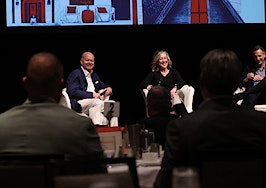In these times, double down — on your skills, on your knowledge, on you. Join us Aug. 8-10 at Inman Connect Las Vegas to lean into the shift and learn from the best. Get your ticket now for the best price.
Real estate agents eager for insights on how to make the transition from a seller’s market to a buyer’s market packed the grand ballroom at the Hilton Midtown in Manhattan Wednesday at Inman Connect New York.
“There’s a lot of agent entrepreneurs overachievers in this room who have not experienced a buyer-driven market,” said panel moderator Dana Cadena. “So you’re in a good seat.”
Cadena, a 23-year real estate industry veteran who has been a KW University Approved Trainer since 2019, asked panelists to explain how they’re ushering consumers through the emotions of a changing market
“Homeowners were really calling the shots for a minute and now that’s continuing to morph,” Cadena said.
Kathy Helbig-Strick, a St. Louis, Missouri-based eXp broker-owner, agreed that “we did see the gamut of emotions running. The sellers really just had a stranglehold on the market. Buyers were worn out, buyers were ticked off — they just didn’t have much of an option. They had to do what they had to do to get a house.”
But then many buyers simply “went on strike,” she said. “They all of a sudden felt like, ‘Hey, I don’t have to do this anymore. I can now kick the sellers back.’ We were really trying to manage everybody’s emotions because the sellers are reacting to the backlash.”
Sellers’ heads are swimming, as they try to figure out what happened to the market, Helbig-Strick said.
“They’re like, ‘I was in control. I heard it was a seller’s market. My neighbor got $100,000 over list price,'” Helbig-Strick said. “They don’t want to concede that it’s happening to them.”
Helbig-Strick, who has sold more than $1 billion in real estate in her 26-year career, said she saw the same kind of reaction from sellers during the last downturn.

Kathy Helbig-Strick | Photo by AJ Canaria & Mercedes Santiago of MoxiWorks
“From like 2008 to 2011, that first year or two was the leading edge of the change,” Helbig-Strick recalled. “Those sellers did not listen — they wanted to put their hands over their ears. They wanted to say, ‘Not my house, not me. I have the biggest lot.’ They just didn’t want to believe it. So it took a year or two years for them to finally realize it was happening to them too.”
Helbig-Strick, who is also a licensed mortgage loan originator, said she had to use her personal experience to convince sellers that they were not immune from the downturn.
“Listen, I lived through this before,” Helbig-Strick would tell sellers during the last downturn. “Don’t do this. We need to look at what’s happening in real-time right now and make sure that we’re doing what we need to do to get you the best offer.”
But buyers are still on strike in some markets, so the transition to a buyer’s market is still in progress, Helbig-Strick said.
The challenge is “figuring out how to work with a balanced market or a changing market,” she said. “We’re not completely into a buyer’s market yet.”
Phillip Salem, who claims more than $100 million in sales working both coasts (New York and California) as a Compass agent, agreed that it’s not just sellers who need coaching. Buyers may have unrealistic expectations as well.
“A desirable property is always going to sell,” Salem said. Buyers may say, “‘Oh, it’s a buyer’s market. We’re gonna go do a lowball offer.’ But in New York — my primary market is New York City, my secondary market is Los Angeles — a desirable property is always going to sell.
“So when my buyers are like, ‘Oh, we’re gonna come in super low,’ I like to present it to them. ‘Well, the sales aren’t showing that you know [properties are selling] in 30 days, 60 days.'”
Salem is also “huge on relationships with the co-broker. I think being nice and kind is truly the only way to get a deal done.”
Consumers need to be coached to worry about leading rather than lagging indicators, Helbig-Strick said.
“Everybody wants to price to their neighbor’s house that sold last summer, and that’s just not what’s necessarily happening right now,” Helbig-Strick said. “So I think if you can come in with the data … that’s what makes the consumer trust you.”
Salem also cited data as a crucial tool for navigating the market shift.
“You can’t bullshit your way through a buyer or a seller,” Salem said. “Presenting data is truly the most important thing. If you don’t know the data, don’t make it up. Go back and research and get back to them in two hours. ‘I’ll get back to you after dinner. I’ll get back to you.’ That’s the biggest thing is presenting the sales. Presenting the numbers.”

Phillip Salem | Photo by AJ Canaria & Mercedes Santiago of MoxiWorks
In addition to selling real estate, Salem owns a “gender-fluid and seasonless” fashion label, AGENT P. Salem said authentic marketing has been their biggest driver of new and repeat business — especially since they stopped worrying about how people would react to their flamboyant dress.
“I’m huge on video. I even produced my own little reality show last year because I was like, ‘You know what, I’m just gonna produce my own,'” Salem said. “You have to ‘make a way’ out of ‘no way.’ You really have to just believe in yourself and believe in what you do and forget the noise. Forget the people. Forget all the negative naysayers out there and just do what you need to do to succeed.”
Helbig-Strick said she’s also a fan of video marketing.
“I’ve lived through a shifting market before and so it makes it a lot easier for me to just talk about what I know and talk about what I learned,” Helbig-Strick said. “So we do a lot of video marketing. I do a lot of stuff with the local news.”
While it’s easy to get discouraged when sales ebb, Helbig-Strick told agents to keep in mind that market shifts are often an opportunity.
“I would say just buckle down, because there are only certain times in certain industries where you can surge ahead,” she said. “You hear people say it all the time: ‘The down markets is where the professionals shine.’ So this is the time to not shrink back. It’s the time to buckle down, double down, put more activity and then be one of the ones that really comes out on top of us in this market.”













